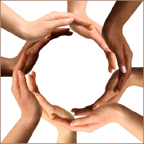Some Things are Universal
By John Williams, Marketing Manager, Stanford Blood Center
Every day in the news we are bombarded with images of conflict, disaster, and crime. We are constantly reminded of the differences between people, especially race, ideology, or nation state. Pro Gaddafi versus anti-Gaddafi forces; warring Afghani factions: Sunni versus Shiites; white versus black. We are often fearful of those who are unlike ourselves.
Some things, however, are common to all of us, whether we’re rich or poor, Chinese or Sudanese. Blood is one of them. We can’t live without it and, when it’s needed, it’s often in short supply. If you do a simple search on the web for blood shortages, you’ll discover just how universal this phenomenon is:
Chinese health minister donates blood amid country’s blood shortage
Uzbekistan facing shortages of donor blood
Shortage of Blood Stock in South Africa
The precious blood of Russia’s donors
New Zealand Blood bank warns of donor crisis in 5 years
Sweden reports nationwide blood shortage
And yet, public-minded citizens around the world do give blood, many on a regular basis. Donating blood is an anonymous act. Unless it’s an autologous or designated donation, the recipient doesn’t know who donated on their behalf. Those receiving the blood products are simply thankful that someone did. Blood is what binds us together. We speak of “blood brothers and “flesh and blood”, terms which reflect a connection. Perhaps we should consider that one day, our life may be saved by someone who is very different than ourselves.

